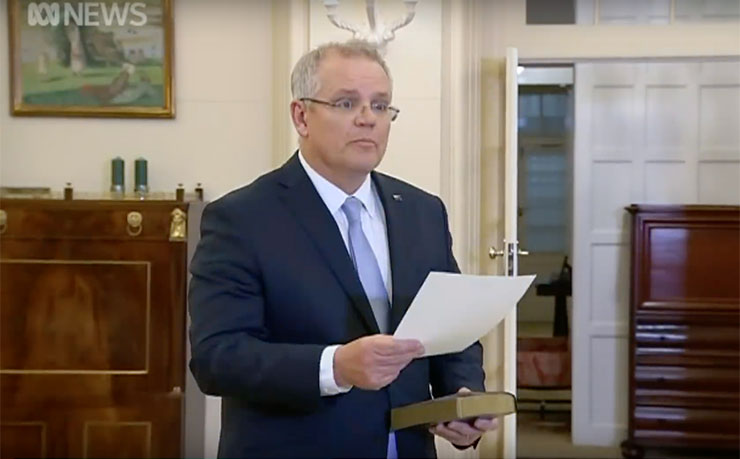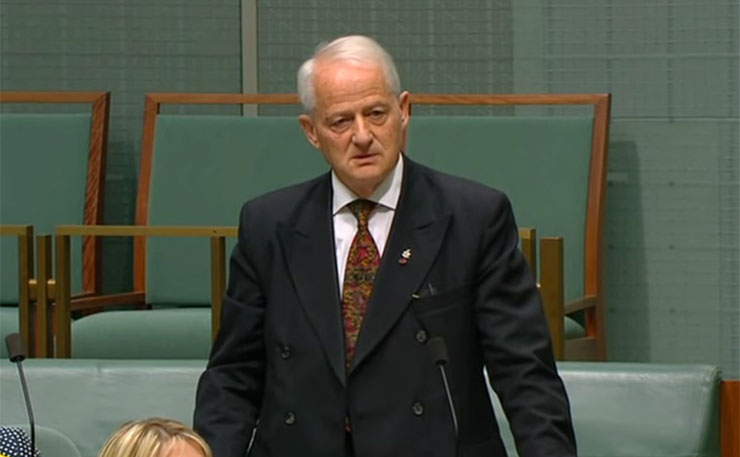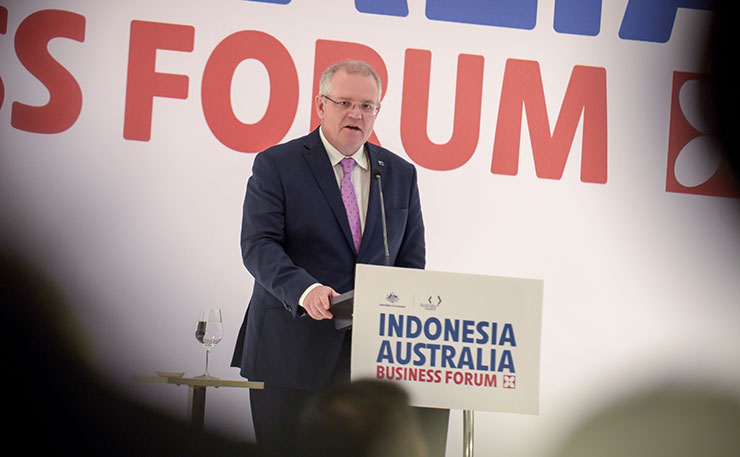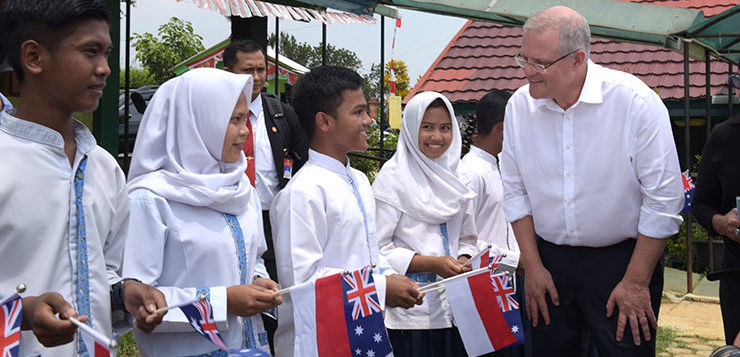Race-baiting populism isn’t helping Scott Morrison, writes Ben Eltham. It’s not even popular.
What sort of government is Scott Morrison running?
It’s a question worth asking. Morrison is the Prime Minister of Australia, the holder of the highest elected office in the land. And yet he came to office with voters knowing almost nothing about his political agenda.
Morrison has not faced a general election as his party’s leader. He has not been opposition leader. He has not presented a policy platform to voters, nor explained in any detail whatsoever what a Morrison government will stand for. Indeed, he can’t even explain why the Liberal Party got rid of Malcolm Turnbull.
The Morrison government is a ship of state adrift without a chart or a rudder. There is no articulated policy agenda beyond some quick fix ‘barnacle scraping’: a $4.6 billion handout to the Catholic and independent schools (incidentally abandoning former education minister Simon Birmingham’s painstakingly constructed needs-based schools funding model), and a dollop of drought relief.
Not only is there no grand vision for the future of the nation, there isn’t even a legislative agenda. Since Morrison took the top job, the government has run out of bills to debate in the Senate, and cancelled a meeting of the Council of Australian Governments.
A look through Morrison’s speeches and media transcripts since taking the prime ministership is instructive. There’s almost nothing there.
His very first cabinet meeting gave us a flavour of what Morrison wanted his government to stand for: nationalist clichés. On August 28th, the new Prime Minister told journalists he wore an Australian flag lapel pin because it reminded him “whose side” he is on. “I’m on the side of the Australian people,” he explained, which is not altogether surprising for a prime minister of Australia.
Morrison added that believes in “a fair go for those who have a go”. Morrison said he would “redefine what fairness means in this country”. Fairness would no longer mean a fair go for all. “Fairness means a fair go for those who have a go.”
Passing over some uncomfortable absences from the meeting – such as Peter Dutton, who was helpfully away on 5 Eyes spying business, he rounded off his short oration with injunctions to “keep our economy strong”, to “keep Australians safe”, and “to keep Australians together”.

Even for veteran observers of politics accustomed to spin and palaver, this was thin gruel. Every prime minister wants a strong economy and to keep Australians safe, after all. It would be something close to treason if the prime minister were to be on the side of some other people who are not the Australian people.
A month later, Morrison was still repeating this basic message, this time on ABC Radio with Fran Kelly.
“What I’m simply saying is keeping the economy strong – which is what pays for hospitals, schools, affordable medicines, Medicare, all of these things – that’s what we’ve been doing as a Government,” he told ABC listeners.
Because we run a strong economy. We keep the Budget under control, which means you can believe us when we say we’ve got record funding for schools and hospitals. Keeping Australians safe equally has been a big priority of Coalition Governments and it’s one we’re continuing to deliver on. But also bringing Australians together, around key issues like our social safety net, ensuring that we’re supporting all Australians to do better and we’re not setting one set of Australians against another by saying you’ve got to tax some more, to tax others less, or you’ve got to hit some people’s schools funding, to fund others.
Even by the impoverished standards of modern political communication, this is eye-wateringly dull. A strong economy. Keeping Australia safe. A disavowal of redistributive tax or education policies. It’s enough to make Donald Trump look like a master communicator.
As Kelly herself observed to Morrison during the 26 September interview, “at the moment, it does look a little like you’re governing by daily announcement”.
As for Morrison’s oft-repeated tautology of “a fair go for those who have a go”, it soon became clear that this was simply a euphemism for more welfare bashing, when he revealed he was exploring forcing job seekers to go and pick fruit as part of their mutual obligation. It was a policy so obviously cack-handed that even the Farmers’ Federation opposed it.

By mid-October, we had a firmer grasp of what Morrison stands for. A leak of the government’s long-suppressed Ruddock review into religious freedom revealed a recommendation to amend federal law to allow religious schools to expel LGBTI students.
As a media firestorm blew up – and it was always going to, given the clear majority of Australians who voted in favour of marriage equality in 2017 – Morrison initially supported the idea, before quickly back-peddling once he realised just how badly the idea was trending in middle Australia.
The religious discrimination debacle was followed by a ground-breaking report by the Intergovernmental Panel on Climate Change, which detailed in scarifying terms just how much trouble a rapidly warming world is in. Morrison dismissed the report, repeatedly misrepresenting his government’s non-existent commitment to the Paris climate change accord. So bizarre was the mismatch between Morrison’s breezy spin about meeting our Paris commitments “at a canter” and the climate doom detailed in granular reality by the IPCC report, media outlets dispensed with niceties and began to call out the government for lying.
Once again, Morrison had found himself tripped up by his instinct for evangelism and culture war, at the very time that voters were beginning to look carefully at the Coalition’s disastrous record on carbon policy.
The culmination of Morrison’s right-wards stumble was the extraordinary scene in the Senate yesterday, when Coalition senators lined up solemnly behind a One Nation motion arguing that “it’s okay to be white”.
As Greens leader Richard Di Natale told the Senate, the injunction was taken straight from an alt-right catch phrase. Even if One Nation leader Pauline Hanson was unaware of the phrase’s provenance, her white supremacist colleague Fraser Anning surely was. And yet no-one in the Liberal or National parties thought fit to question this bald-faced assertion of white nationalism in the Senate of Australia. As late as Monday evening, Attorney-General Christian Porter was defending the Coalition vote on the motion as opposition to racism in all its forms. If only it was.
As I argued in August on the occasion of Fraser Anning’s first speech, the drift of the Liberal Party to the right has exposed all sorts of disquieting connections between the party of Menzies and the forces of racism and illiberalism. Now, once again, those connections have been given concrete form, in the most overt manner possible.
Politically, the vote is a disaster for Morrison. Already flailing after his self-inflicted wounds supporting the right of religious schools to discriminate against LGBTI students, here was a fresh example of the government’s embrace of the racist right.

The “okay to be white” implosion is mystifying to anyone who thinks the government wants to win the Wentworth by-election this weekend. Malcolm Turnbull’s recently departed electorate is economically conservative and socially liberal, with a high proportion of LGBTI and Jewish voters – precisely the people who are not likely to be enthused by the Coalition’s desire to flaunt its anti-gay and white power credentials.
But if the removal of Malcolm Turnbull proved anything, it is that the culture warriors in the Liberal Party’s right are entirely comfortable with short-term electoral pain, if it means they can control the ideological future of the party.
Morrison comes to the prime ministership unusually ill-prepared for Australia’s highest office. Neither a moderate nor a true movement conservative, he has secured the top job largely as a result of a historic realignment in his party’s plate tectonics. Morrison is not a big thinker or a writer of books. He embodies no meaningful political philosophy; one doubts he has read Edmund Burke or Michael Oakeshott. You can search in vain for any substantive articulation of his broader political philosophies.
What has emerged in office is instead a form of lukewarm race-baiting populism, gesturing to the Liberal base in a slightly more convincing way than Malcolm Turnbull, and undergirded by Morrison’s strong reservoir of Christian evangelical faith.
The problem with such a position was made clear by last year’s marriage plebiscite: Australians are a pretty tolerant and liberal bunch, on the whole.
Australia is not a particularly religious nation, and even right-leaning voters are generally wary of American-style flag waving and heart-holding. For every vote Morrison secures in the party’s right-leaning base, he risks losing two swinging voters in the centre.
As a result, Morrison’s populism isn’t even popular. The Coalition is polling at around 46-54 on current indications. On any measure, that’s an incipient electoral wipe-out.
Right now, the government is roughly in the position of Wile E. Coyote after running off a cliff: its legs are still pumping, but the final plunge is only a matter of a time.
And that means politics in Australia is about to get very weird. The government continues to govern, because it must. But it has no idea what it is governing for, or what it wants to achieve in the next six months. There will be many more hare-brained schemes, wacky Senate votes and policies-by-announcement in months to come.
Donate To New Matilda
New Matilda is a small, independent media outlet. We survive through reader contributions, and never losing a lawsuit. If you got something from this article, giving something back helps us to continue speaking truth to power. Every little bit counts.




